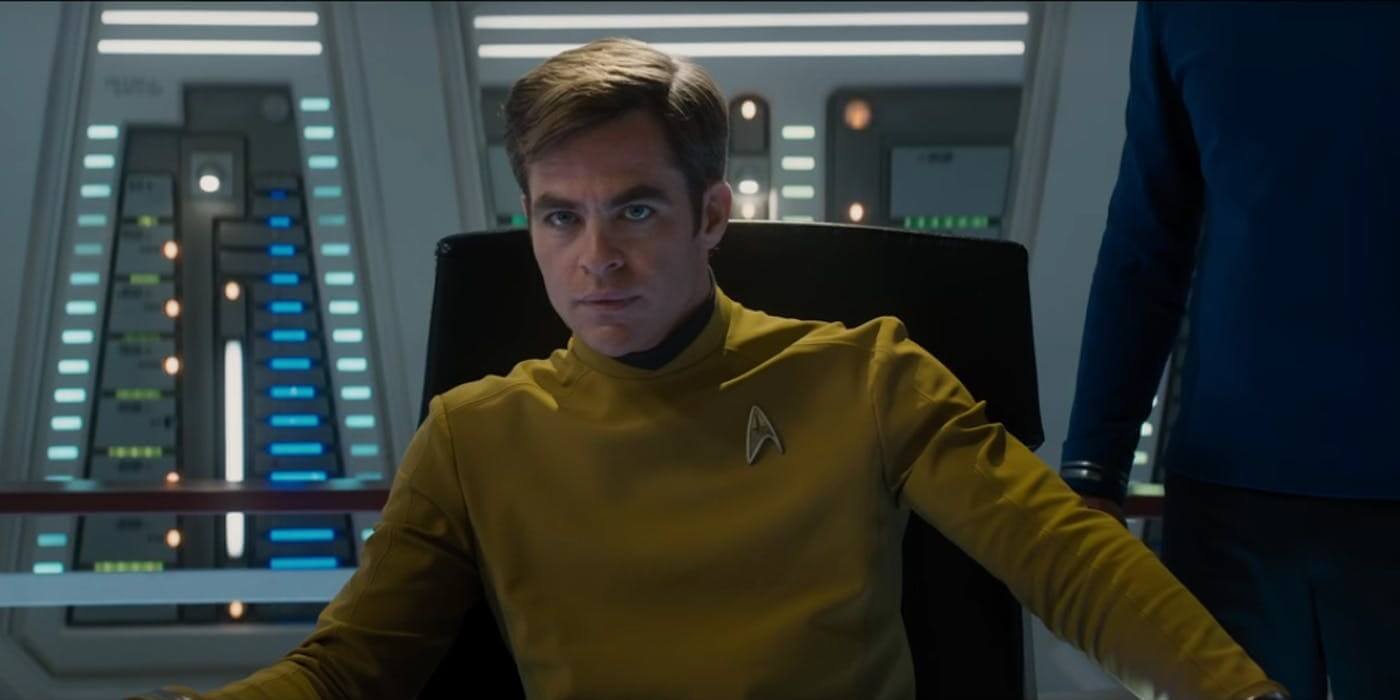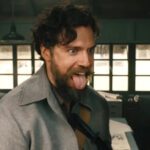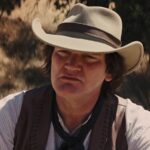Where No Man Has Gone Before
Since its inception, the Kelvin Timeline – that is, the alternate timeline that has encompassed Star Trek (2009), Star Trek Into Darkness and Star Trek Beyond – has been a real shot in the arm for the Star Trek brand, allowing the new films to simultaneously honor what has come before while forging their own path with unique takes on familiar characters. Chief among them, as one would expect, is Captain James T. Kirk, now played by Chris Pine. Kelvin Kirk is different from his alternate universe counterpart, growing up under different circumstances and having to face great threats so early in his Starfleet career. The Kelvin Timeline is in part the story of how an aimless youth living in his father’s shadow grows into the greatest hero in the universe, and what he does once he’s become a legend.
*Spoilers for all three Kelvin Timeline films*
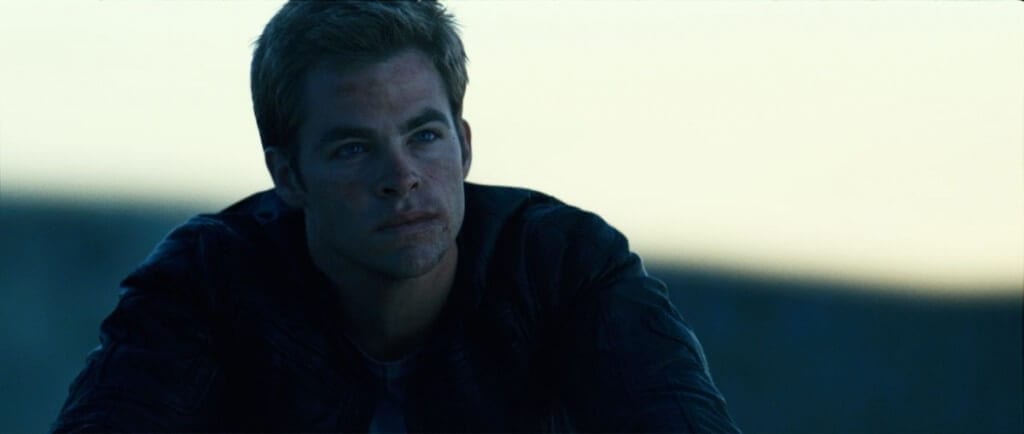
Star Trek (2009)
One of the many great things about Trek’09 is how it uses Kirk to subvert the traditional adventure hero, a mold which Classic Kirk fits pretty well. For instance, every time Kirk gets into a fight, he has his ass handed to him. The guys in the bar, the Romulans on Vulcan, Spock on the bridge (twice!), the monster on the ice moon; all of these dust-ups result in Kirk barely surviving, or at least escaping potentially severe damage. Moreover, he only makes it through someone else’s good graces: Pike calls off the barflies, Sulu kills the Romulans, Spock restrains himself both times, and Spock Prime wards off the ice moon monster. The only fight Kirk actually wins is when he faces Nero’s lieutenant during the climax, and he only wins because he cheats, grabbing his opponent’s gun and shooting him before he can be beaten to an even bloodier pulp.
Cheating is also how he achieves all his major accomplishments throughout the film. He first cheats at the Kobayashi Maru (while it was established in The Wrath of Khan that this is how he beat the test, it’s inclusion here fits with Kirk’s larger arc), carving a place for himself in Starfleet history by getting around the rules. When he’s grounded following the disciplinary hearing, he gets onto the Enterprise because McCoy drugs him and smuggles him aboard as his patient. He becomes the captain because he prods Spock into disqualifying himself from the position. Each step of the way he circumvents the rules until he has become the Captain Kirk we want him to be, at least nominally.
Then there are the women. Kirk is fondly remembered for being Starfleet’s biggest playboy, but in this movie he has a pretty lousy track record. We see him flirt a lot, but he never seems to get any traction. In one scene he’s in bed with an alien student, but they’re interrupted before their foreplay can lead anywhere. The biggest failure in this regard, though, is Uhura. She’s the main female character, and the one for whom Kirk lusts throughout, but he doesn’t get her; Spock does. Kirk is the macho man of action but Uhura would rather be with, for all intents and purposes, the nerd. (It’s worth noting that Uhura is the one to interrupt his liaison with the green woman, a harbinger of things to come.)The series’ most celebrated ladies’ man strikes out every time he gets up to bat.

If this were just a subversion for the sake of being a subversion it would still be kind of neat, but it actually has a larger purpose: to establish Kirk as being on a hero’s journey. When Pike first convinces him to join Starfleet, he mentions Kirk’s father constantly. He’s obviously trying to motivate Kirk, but he’s actually putting Kirk in his father’s shadow; Kirk is aimless, never believing he can be the hero his father was, but Pike pushes him to live up to the old man, and now Kirk’s on a mission to be as good as his dad. However, his father was a guy caught in extraordinary circumstances who rose to the occasion; Kirk, in his zeal to be a hero, is trying to replicate that and, barring a time-traveling ship piloted by murderous Romulans, it’s not something that just happens. So Kirk does things like cheat at the Kobayashi Maru and board a ship he’s not allowed to be on to force himself to the head of his class and into the action. The first thing he says when taking Pike up on his offer is a promise to outdo his father. (“Four years? I’ll do it in three.”)
Luckily for Earth, Kirk really is as good as he hopes he is. He forces his way into the captain’s chair, but once seated he makes all the right decisions, and a big part of why is that he accepts help; his father was forced to go it alone and that’s why he had to die, but Kirk has his crew backing him up, and when he becomes the captain he realizes he’s only made it this far with the help of others. He’d be dead or stuck on Earth or the ice moon if it wasn’t for Spock, McCoy, Sulu, Uhura and Scotty (Chekov is just kind of there, but he sure is funny), and he takes that to heart, using everyone to the best of their abilities like a good captain should. He only becomes a hero because he doesn’t stand alone; he stands with his friends. (It isn’t until the very end that Kirk wears his traditional captain’s uniform, interacting with his crew while he does; till this point he wears an all-black outfit with the Starfleet emblem gone but for a faded imprint, suggesting he is not yet what we want him to be.)
Nero mirrors Kirk in that they are both ordinary people spurred on by tragedy to become something more. Nero was a miner on Romulus, a blue-collar family man with no violent inclinations, until he lost everyone he ever loved in a massive supernova that engulfed his home. But while Kirk’s loss of his father pushed him to become a hero, Nero’s leaves him craving only vengeance; he wants to spread his misery to billions of innocent people just to get back at Spock and the Federation – who were not even responsible for Romulus exploding, just convenient targets for his grief – while Kirk fights to save those same people, his enemy being the threat that literally killed his father. Hero and villain (heroes and villain, really, as Spock has a similar journey) are two men trying to honor their lost family and discovering who they really are along the way.
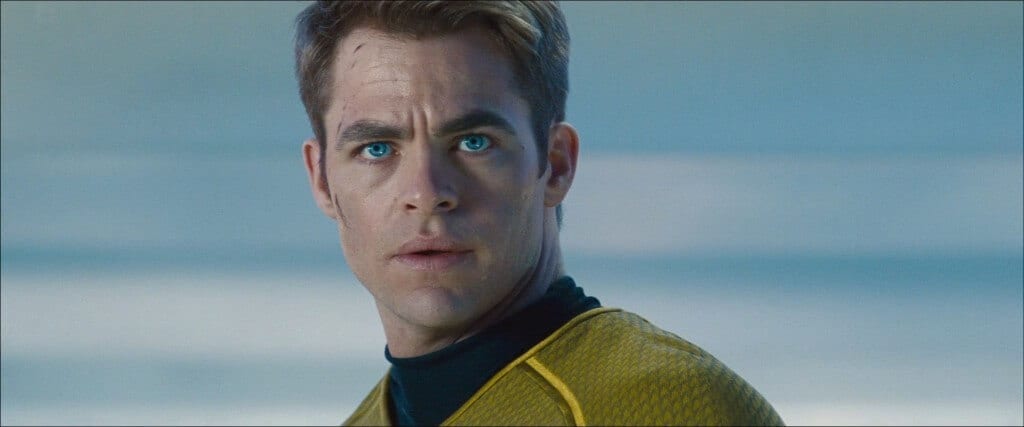
Star Trek Into Darkness (2013)
Kirk is now where he wants to be and where we want him: captain of the Enterprise. Once again, though, he has to prove himself because no one else seems to think he’s ready to be the hero of the franchise. In the opening scene, he breaks the Prime Directive to save a planet full of people who are about to be wiped out by a volcano, then breaks it again to save Spock, who is caught in said volcano. Pike dresses him down for this, and the top brass at Starfleet want him to go back to training, all because he refused to let a bunch of innocent people die. This is the central dilemma of the movie: Kirk knows how to be a hero but nobody believes in him. Pike, who in Star Trek admired Kirk’s ability to act first and think later, here wants him to sit down, shut up and do what he’s told. (Notice, too, that Kirk again finds himself in a coitus interruptus situation, this time with two alien women – because of course – and is summoned away from them not by Uhura but by Starfleet; he isn’t allowed his sexual conquest because they won’t let him be the hero archetype he should be.) When Pike manages to get Kirk assigned as his first officer, it’s in the hopes that Kirk will learn to follow orders, and in the Starfleet meeting he tries to get Kirk to stifle himself. But he’s wrong; Kirk is the only one to figure out what Khan is up to (Marcus doesn’t count because he’s in on it) and likely saves a few lives with his quick thinking. Pike, who sought to keep Kirk under his thumb, ends up dead.
Kirk is then put in charge of the retaliation mission against Khan, and this time he does so without questioning his orders, letting his anger over Pike’s death, and Pike’s admonishment, inform his decision. It’s his crew who talk him down, one by one telling him that his orders are wrong. Kirk’s emotions are keeping him from his typical independent thinking, but as with the previous film his friends are his saving grace, allowing him to be the hero by supporting him with their own skill set (Spock’s logic and adherence to Starfleet policy, Scotty’s understanding of the missile tech, etc.). Kirk once more defies his orders and does what he knows is right, forgoing his revenge to let justice be served through the proper channels, in the process averting the war Marcus is intent on triggering, saving Earth once again and showing Starfleet that maybe they don’t always know what’s best for everyone.

Kirk’s heroism this time also serves to inspire the same in his friends, Spock in particular. Spock believes in strictly following Starfleet policy; he disagreed with Kirk going back to save his life and doesn’t understand why the captain of the starship would sacrifice so much to save one man. He reports in to Starfleet, “ratting out” Kirk because he believes it to be a clear case of right and wrong and he cannot lie, even for someone who saved his life. When it’s the crews’ lives in the balance, however, Spock takes a bit of inspiration from Kirk and deceives Khan; he may put his own Vulcan conscience at ease by reasoning that he technically isn’t lying, but it’s a reach and he knows it. Then, when Kirk sacrifices himself to save the crew, Spock finally understands the principle of sacrificing yourself for your friends; a captain – a hero – doesn’t ask that of someone else, but demands it of himself. (This is why I don’t really mind the cribbing of the Wrath of Khan ending; it serves a purpose to the story and the characters, as opposed to being a crutch.) Then, when it’s time to take care of Khan, Spock chooses the few or the one over the many, leaving alive the most dangerous man in the universe to save his best friend’s life, just as Kirk laid it all on the line for Spock in the beginning.
The villains are the perfect compliments to Kirk’s arc. Marcus is the personification of the potential corruption of Starfleet and how following orders blindly is not always the right decision. Like Kirk he flouts the rules of the Federation but he’s doing it to start a war instead of save lives; he is also, unlike Kirk, willing to allow others to die in his place, even if he has to kill them himself. Khan is, like Kirk, another tool for Starfleet to use for its own purposes, a highly capable soldier they want – or, at least, Marcus wants – to follow orders unquestioningly. Khan is also loyal to his crew, and does Marcus’ bidding in the hopes of saving their lives, sacrificing his own dignity for them. Once he sees a way out, Khan goes rogue and turns on Marcus, disobeying orders as Kirk does. When left to his own devices, Khan finally separates himself from Kirk, getting violent revenge instead of leaving Marcus to the authorities and attacking the Enterprise once he believes he has his crew. Though Khan has many similar traits to Kirk, he is ultimately as antithetical to the hero as Marcus is.
Once the adventure is over, Kirk is finally acknowledged by Starfleet. He’s given command of the Enterprise and sent on a five-year mission, Starfleet’s way of admitting that they were wrong and he is every bit the hero his legendary father was. And they’re not alone: Carol Marcus, the main female character this time (at least as far as Kirk is concerned) seemed more interested in McCoy throughout, but in the end looks at Kirk in a new, admiring light; Spock has a better understanding of his friendship with Kirk and his role in supporting his heroics; Scotty is back on the crew, ready to back up his captain. This is the end of the hero’s journey for Captain James Tiberius Kirk.
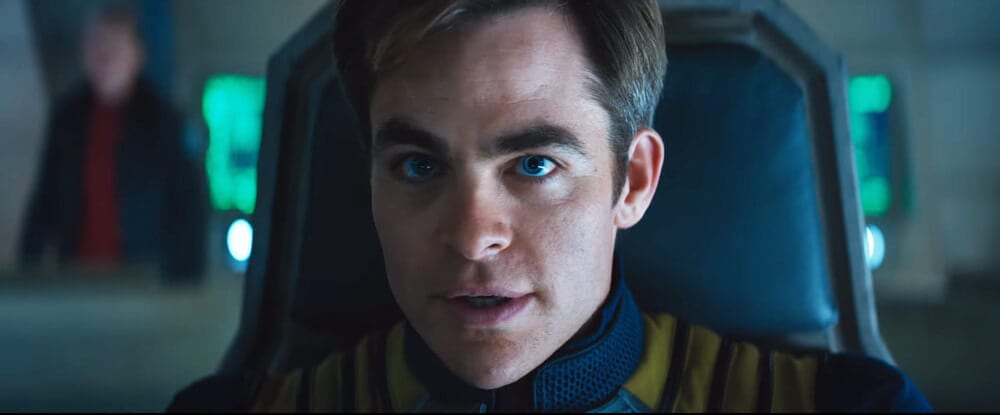
Star Trek Beyond (2016)
The third installment in the Kelvin Universe series finds Kirk well into his five-year mission… and bored out of his mind. After saving planets and stopping genetically-altered super soldiers, delivering trinkets on behalf of feuding races doesn’t hold much excitement for him. In these opening scenes, Kirk is actually the stand-in for people (like me) who found the original series dull, calling his space travels “episodic” in his Captain’s Log with more than a hint of melancholy in his voice. Kirk has little motivation anymore; he’s completed his metamorphosis into a full-fledged hero and more than filled his father’s shoes. In the previous films, he really made a difference. What’s the point in boldly going where no man has gone before if all you’re going to do when you get there is study outlying civilizations and broker treaties in petty disputes? It’s gotten so bad that Kirk wants out of the captain’s chair, lobbying for a vice-admiral position to at least advance his career if he can’t do something he feels matters.
It’s when he gets wrapped up in Krall’s violent terrorist plot that Kirk sees the virtue in the little things. The lynchpin to Krall’s plan is the very “doo-dad” he was to deliver to the alien race in the beginning. This little item, something Kirk sighed as he described to its intended recipients, is the thing that can end countless lives and destroy an intergalactic peace for good. It is a microcosm of the mundane tasks Kirk performs in his five-year mission, something most – including Kirk – would scoff at but which has value beyond its apparent insignificance. Something as banal as delivering a gift to bunch of wombat-looking things leads Kirk to a battle like he’s never fought before.
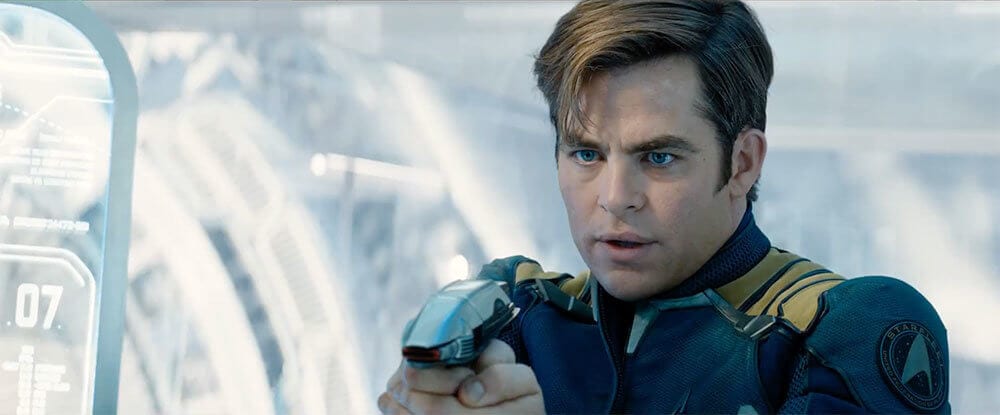
Moreover, he comes to realize that this is exactly the sort of thing his father would have been doing had he survived the attack on the Kelvin. George Kirk would’ve been performing all the little tasks his son now does, and he would’ve done them with as much dignity and honor as he had when he sacrificed himself to save his wife and his shipmates, and that is the man Jim Kirk wants to be. It is in the small things as well as the big that we reveal ourselves, and Kirk is now appreciative of how much the small things matter. This is what solidifies his desire to captain the Enterprise and continue leading the mission.
Krall/Balthazar Edison is in a similar position to Kirk, having been a hero of the Federation who won a war and then got lost in navigating the peace. He was raised to be a warrior and finds the ideals of the Federation naive. When his ship the Franklin was lost, he was never rescued, forgotten by the Federation in practical terms as he believed himself to be philosophically. If the Federation represents progress, Krall believes that progress is killing us and he wants to tear down the Federation to allow the universe to survive. Whereas Kirk sees peace as meaningless, Krall sees it as dangerous, and his fanaticism is what gives Kirk a new perspective; when they fight at the end, Krall says he was born into war while Kirk finally realizes that the lesson of his father’s death – and his own birth – is that the end is not to keep fighting but to stop the fighting for good, and to sacrifice yourself to do it if need be (which, after Into Darkness, we know Kirk is willing to do).
***
Kelvin Kirk has gone on quite a journey over three films. With the recent news that Chris Hemsworth will reprise his role as George Kirk in the next installment, it looks like he’s about to develop even further. Whether he ever becomes the same man he was in his William Shatner guise is up in the air, but whatever happens, this version of Captain Kirk is, as his best friend would say, fascinating.

